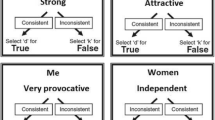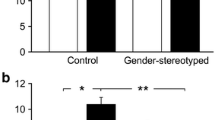Abstract
Mental rotation is a task in which men outscore women by up to one standard deviation. Many biological, strategic, experiential, and motivational factors concur to explain this gender gap. Among these there are gender stereotypes, which could either harm or favor performance, giving rise, respectively, to stereotype threat or lift effects. This study examined effects due to stereotypes induced by testing women in a minority mixed-gender group composition (subtle message) when provided with instructions about men’s or women’s superiority (blatant message), in order to assess the hypothesis that the effort of disconfirming a negative stereotype causes increased performance when two messages, either blatant or subtle, are provided. Sixty-six men and 78 women tested either in a mixed-gender or a same-gender group composition were provided with one of the three instructions (men better, women better, nullifying) after performing a mental rotation test (baseline measure) and before taking another one. Results showed that women increased performance mainly when instructed that men score higher in the mixed-gender group composition, and after the nullifying instructions when tested in the same-gender group composition. Men increased performance mainly when they were instructed that women scored higher. Taken together, the results showed that both genders improve performance, when two threats arise both subtly and blatantly, or when no threat is in the air. Effects of implicit and explicit activated stereotypes are discussed.
Similar content being viewed by others
References
Beilock, S. L., & Carr, T. H. (2005). When high-powered people fail: Working memory and ‘‘choking under pressure’’ in math. Psychological Science, 16, 101–105.
Cohen, J. (1988). Statistical power analysis for the behavioral sciences (2nd ed.). Mahwah, NJ: Lawrence Erlbaum Associates.
Estes, Z., & Felker, S. (2012). Confidence mediates the sex difference in mental rotation performance. Archives of Sexual Behavior, 41, 557–570.
Flore, P., & Wicherts, J. M. (2015). Does stereotype threat influence performance of girls in stereotyped domains? A meta-analysis. Journal of School Psychology, 53, 25–44.
Geiser, C., Lehmann, W., & Eid, M. (2006). Separating‘‘rotators’’from ‘‘nonrotators’’ in the mental rotations test: A multigroup latent class analysis. Multivariate Behavioral Research, 41, 261–293.
Halpern, D. F. (2012). Sex differences in cognitive abilities (4th ed.). Hove, UK: Psychology Press.
Halpern, D. F., Straight, C. A., & Stephenson, C. L. (2011). Beliefs about cognitive gender differences: Accurate for direction, underestimated for size. Sex Roles, 64, 336–347.
Hausmann, M. (2014). Arts versus science: Academic background implicitly activates gender stereotypes on cognitive abilities with threat raising men’s (but lowering women’s) performance. Intelligence, 46, 235–245.
Hausmann, M., Schoofs, D., Rosenthal, H. E., & Jordan, K. (2009). Interactive effects of sex hormones and gender stereotypes on cognitive sex differences: A psychobiosocial approach. Psychoneuroendocrinology, 34, 389–401.
Heil, M., Jansen, P., Quaiser-Pohl, C., & Neuburger, S. (2012). Gender-specific effects of artificially induced gender beliefs in mental rotation. Learning and Individual Differences, 22, 350–353.
Hirnstein, M., Andrews, L. C., & Hausmann, M. (2014). Gender-stereotyping and cognitive sex differences in mixed and same-sex groups. Archives of Sexual Behavior, 43, 1663–1673.
Hirnstein, M., Bayer, U., & Hausmann, M. (2009). Sex-specific response strategies in mental rotation. Learning and Individual Differences, 19, 225–228.
Hirnstein, M., Freund, N., & Hausmann, M. (2012). Gender stereotyping enhances verbal fluency performance in men (and women). Zeitschrift für Psychologie, 220, 70–77.
Hugdahl, K., Thomsen, T., & Ersland, L. (2006). Sex differences in visuo-spatial processing: An fMRI study of mental rotation. Neuropsychologia, 44, 1575–1583.
Hyde, J. S. (2005). The gender similarities hypothesis. American Psychologist, 60, 581–592.
Hyde, J. S. (2014). Gender similarities and differences. Annual Review of Psychology, 65, 373–398.
Inzlicht, M., & Ben-Zeev, T. (2000). A threatening intellectual environment: Why females are susceptible to experiencing problem-solving deficits in the presence of males. Psychological Science, 11, 365–371.
Jansen, P., Titze, C., & Heil, M. (2009). The influence of juggling on mental rotation performance. International Journal of Sport Psychology, 40, 351–359.
Jordan, K., Wuestenberg, T., Heinze, H. J., Peters, M., & Jaencke, L. (2002). Women and men exhibit different cortical activation patterns during mental rotation tasks. Neuropsychologia, 40, 2397–2408.
Massa, L. J., Mayer, R. E., & Bohon, L. M. (2005). Individual differences in gender role beliefs influence spatial ability test performance. Learning and Individual Differences, 15, 99–111.
McGlone, M. S., & Aronson, J. (2006). Stereotype threat, identity salience, and spatial reasoning. Journal of Applied Developmental Psychology, 27, 486–493.
Miller, D. I., & Halpern, D. F. (2014). The new science of cognitive sex differences. Trends in Cognitive Sciences, 18, 37–45.
Moè, A. (2009). Are males always better than females in mental rotation? Exploring a gender belief explanation. Learning and Individual Differences, 19, 21–27.
Moè, A. (2012). Gender difference does not mean genetic difference: Externalizing improves performance in mental rotation. Learning and Individual Differences, 22, 20–24.
Moè, A. (2016a). Does experience with spatial school subjects favour girls’ mental rotation performance? Learning and Individual Differences, 47, 11–16.
Moè, A. (2016b). Teaching motivation and strategies to improve mental rotation abilities. Intelligence, 59, 16–23.
Moè, A. (2018). Mental rotation and mathematics: Gender-stereotyped beliefs and relationships in primary school children. Learning and Individual Differences, 61, 172–180.
Moe, A., Meneghetti, C., & Cadinu, M. (2009). Women and mental rotation: Incremental theory and spatial strategy use enhance performance. Personality and Individual Differences, 46, 187–191.
Moè, A., & Pazzaglia, F. (2006). Following the instructions! Effects of gender beliefs in mental rotation. Learning and Individual Differences, 16, 369–377.
Moè, A., & Pazzaglia, F. (2010). Beyond genetics in mental rotation test performance: The power of effort attribution. Learning and Individual Differences, 20, 464–468.
Moore, D. S., & Johnson, S. P. (2008). Mental rotation in human infants: A sex difference. Psychological Science, 19, 1063–1066.
Moreau, D., Clerc, J., Mansy-Dannay, A., & Guerrien, A. (2012). Enhancing spatial ability through sport practice. Evidence for an effect of motor training on mental rotation performance. Journal of Individual Differences, 33, 83–88.
Neuburger, S., Ruthsatz, V., Jansen, P., Heil, M., & Quaiser-Pohl, C. (2013). Acceptance and effects of role models in the spatial domain. A storytelling experiment with fourth graders. Frontiers in Psychological and Behavioral Science, 2, 73–88.
Pahlke, E., Hyde, J. S., & Allison, C. M. (2014). The effects of single-sex compared with coeducational schooling on students’ performance and attitudes: A meta-analysis. Psychological Bulletin, 140, 1042–1072.
Peters, M., Laeng, B., Latham, K., & Jackson, M. (1995). A redrawn Vandenberg and Kuse Mental Rotations Test: Different versions and factors that affect performance. Brain and Cognition, 28, 39–58.
Peters, M., Lehmann, W., Takahira, S., Takeuchi, Y., & Jordan, K. (2006). Mental rotation test performance in four cross-cultural samples (N = 3367): Overall sex differences and the role of academic program in performance. Cortex, 42, 1005–1014.
Pezaris, E., & Casey, M. B. (1991). Girls who use “masculine” problem-solving strategies on a spatial task: Proposed genetic and environmental factors. Brain and Cognition, 17, 1–22.
Picho, K., Rodriguez, A., & Finnie, L. (2013). Exploring the moderating role of context on the mathematics performance of females under stereotype threat: A meta-analysis. Journal of Social Psychology, 153, 299–333.
Pietsh, S., & Jansen, P. (2012). Different mental rotation performance in students of music, sport, and education. Learning and Individual Differences, 22, 159–163.
Pletzer, B. (2014). Sex-specific strategy use and global-local processing: A perspective toward integrating sex differences in cognition. Frontiers in Neuroscience, 8, 1–6.
Steele, C. M. (1997). A threat in the air: How stereotypes shape intellectual identity and performance. American Psychologist, 52, 613–629.
Titze, C., Jansen, P., & Heil, M. (2011). Single-sex school girls outperform girls attending a co-educative school in mental rotation accuracy. Sex Roles, 65, 704–711.
Vandenberg, S. G., & Kuse, A. R. (1978). Mental rotation, a group test of three-dimensional spatial visualization. Perceptual and Motor Skills, 47, 599–604.
Voyer, D., Voyer, S., & Bryden, M. P. (1995). Magnitude of sex differences in spatial abilities: A meta-analysis and consideration of critical variables. Psychological Bulletin, 117, 250–270.
Walton, G. M., & Cohen, G. L. (2003). Stereotype lift. Journal of Experimental Social Psychology, 39, 456–467.
Wraga, M., Duncan, L., Jacobs, E., Helt, M., & Church, J. (2006a). Stereotype susceptibility narrows the gender gap in imagined self-rotation performance. Psychonomic Bulletin & Review, 13, 813–819.
Wraga, M., Helt, M., Jacobs, E., & Sullivan, K. (2006b). Neural basis of stereotype-induced shifts in women’s mental rotation performance. Social Cognitive and Affective Neuroscience, 2, 12–19.
Acknowledgements
I am very grateful to Michael Peters for providing me the redrawn MRT. Many thanks to Drs. Ceccarelli Fabio, Giulia Corrà, Giulia Dallaga, and Gianmaria Lovetere for their help in data collection.
Author information
Authors and Affiliations
Corresponding author
Ethics declarations
Conflict of interest
Angelica Moè declares that she has no conflict of interest.
Ethical Approval
All procedures performed in studies involving human participants were in accordance with the ethical standards of the institutional and/or national research committee and with the 1964 Helsinki declaration and its later amendments or comparable ethical standards.
Informed Consent
Informed consent was obtained from all individual participants included in the study.
Rights and permissions
About this article
Cite this article
Moè, A. Effects of Group Gender Composition on Mental Rotation Test Performance in Women. Arch Sex Behav 47, 2299–2305 (2018). https://doi.org/10.1007/s10508-018-1245-0
Received:
Revised:
Accepted:
Published:
Issue Date:
DOI: https://doi.org/10.1007/s10508-018-1245-0




